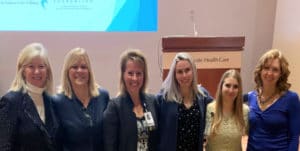Advocate Aurora Health’s Lutheran Hospital Creates Pilot Program to Identify, Support Victims of Human Trafficking

Part of the newly-trained ER team at Advocate Aurora Health’s Lutheran Hospital.
A few years ago, Karen Stanford, manager of the emergency department at Advocate Lutheran Hospital — part of Advocate Aurora Health — in Park Ridge, Ill., learned how important it is to recognize and help victims of human trafficking. In a conversation with her children, her daughter — then 12 — casually mentioned that someone had approached her.
“My daughter was walking home from the bus stop — literally, one block — when a white truck pulled up next to her,” Stanford says. After the driver asked her daughter if she needed a ride home, “my daughter stated that she did not. The driver then said, ‘That’s too bad, I came here just for you.’”
The scariest part of the conversation, says Stanford, is that “my daughter simply did not think anything of it until I brought up the issue.”
The incident spurred Stanford to contact Paul Besler, vice president of Selah Freedom, a global network of leading anti-sexual exploitation service providers. The two women began working on a program of human trafficking awareness and education for staff at the hospital.
Then Besler was asked by the United Nations to partner with them in a pilot study on helping hospital staff identify and assist victims of sexual exploitation. The pilot study was operating under the UN program, “Global Strategic Operatives for the Eradication of Human Trafficking” (GSO), developed after a 2018 UN forum on eliminating human trafficking. Besler recommended Advocate Lutheran for the study, since they had already been developing a plan.
Advocate Aurora Health’s Lutheran Hospital is one of six hospital systems across the United States participating in the pilot program. The locations were chosen based on higher-than-average rates of human trafficking in their areas.
Deb O’Hara-Rusckowski, a co-founder of GSO, told the Catholic News Agency in January that it decided to start the program with medical institutions because research has shown that about 88 percent of victims of human trafficking seek medical treatment at some point while they are being trafficked.
Stanford reports that training has been completed for 98 percent of the emergency department staff and more than 300 team members at Lutheran, centered around the high risk departments (e.g., obstetrics and behavioral health). She says that there has already been an uptick in the number of reported cases. “Last year, we only identified two or three victims of human trafficking,” Stanford says. “This year, we have identified at least 15 to date. I do not think there has been an increase, but rather a lack of recognition” in the past.
Training at Lutheran was divided into staff roles within the organization. Part of the training included a survivor who told their story. “This was critical, as it helped to disband myths about human trafficking and brought people into the terrifying world [of the victim] to better understand some of the difficult decisions they were faced with to survive,” Stanford says.
There were two parts to the training. Part one was geared toward all audiences, and consisted of learning the signs of human trafficking and hearing the survivor’s story. Part two focused on tools for clinical staff to use, and education about documentation and laws. The education portion also included the policies Stanford developed for the hospital.
“Licensed professionals are mandated reporters, so it was important that we understood the laws on human trafficking,” says Stanford. For example, if an individual is 18 years of age or older and does not want to report being trafficked, hospital staff must adhere to their wishes.
Advocate Aurora Health currently is working on rolling out similar plans across all of its locations. “We are completing a system-wide policy so that it is consistent and standardized throughout all of our hospitals,” Stanford says. “Each site has a task force to help develop a procedure specific to their site, along with community resources.”
Stanford says she shared Advocate Lutheran’s procedures with the other Advocate Aurora sites to help them implement their own procedures. She says the support of Advocate Aurora’s executive team has been key to successful implementation. “They took active roles in getting our partnership underway … [and] are still active in helping us move this forward throughout our system,” she adds.
As the new program rolls out to all 26 Advocate Aurora locations, Stanford sees it as another way to better serve the people who come to them for help. “Victims of human trafficking are a patient population that we identified [that] needed much more support and the education of our health care team,” she says. “Our partnership with Selah Freedom and the UN afforded us opportunities and access to resources that we normally would not have had.”
Serving all patients is part of Advocate Aurora Health’s focus on transforming the standard of care. “Our overall mission,” she adds, “is to help people live well.”
Join Our Mailing LIst
Follow on Facebook
Iredell Adult Day Services Hosts Ribbon-Cutting to Celebrate Adult Day Health Certification - CHHSM
www.chhsm.org
Iredell Adult Day Services (IADS) in Newton, N.C. — a nonprofit organization dedicated to caring for older adults, vulnerable groups, and their families, and part of EveryAge — hosted a ribbon cut...